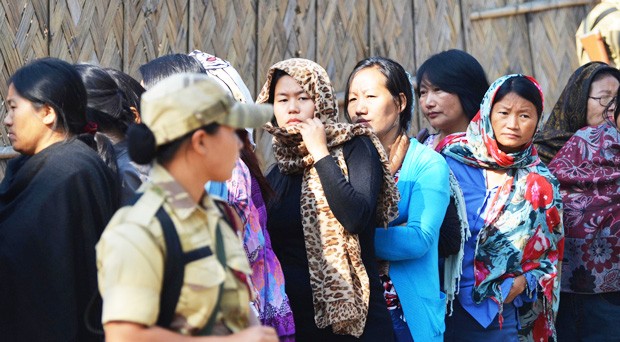Naga women line up to cast their vote in a polling booth.

• 33% reservation to empower women and change the structure of society
• Why not Nagaland state govt “pass their own state assembly resolution to give provision to women?”
Vishü Rita Krocha
Dimapur | August 24
The landmark decision of the state government to conduct elections to the Urban Local Bodies (ULBs) under Nagaland Municipal Act, 2001 by granting 33% reservation for women, has ignited a ray of hope for intending women candidates to start taking part in the decision making bodies. It is like an answered prayer for the 38 year old contending woman candidate, Khazü Dukru, who is planning to contest from one of the colonies in Pfutsero town when the 33% reservation for women is implemented.
“Without reservation, I may not contest,” she said, while stating that politics has been the domain of men for all these years. “Politically, it is the man’s decision,” she added and enunciated from many past experiences and observations that even if a woman candidate is far better than a male candidate, the public vote would naturally go to the latter.
In this regard, she felt that the chances to win without reservation would be very slim. “I am also apprehensive because many people would say, ‘I will support you if you contest’, but when the real time comes, the vote speaks for itself,” she explained. She sadly observed that women themselves end up following their husbands when it comes to elections. Further speaking on the influence that men have during elections, she added, “men always support men, and women always support their husbands.”
Therefore, she asserted that the 33% reservation would make the much needed base for women. Not all women, or even men for that matter, may play their roles efficiently, but “give us a chance to prove ourselves,” she appealed. Khazü Dukru is currently a member of the Pfütsero Citizens Welfare Forum and has been actively involved in working towards the welfare of the town.
The Director of Kalos Society, Pfutsero, Kupelhi Losou said that 33% reservation for women will not only empower women but also change the structure of the society. Strongly advocating for women participation in decision making, he said, women tackle issues “faster” than men. He further cited the instance of Pfutsero Citizens’ Welfare Forum wherein he observed that the few women members have responded faster to problems and issues. “I am not saying that the menfolk are not doing their part, but the women members are doing far better than men,” he noted.
Meanwhile, Commissioner and Secretary for Municipal Affairs, Menukhol John said that, “since the government has decided to go ahead with the elections, we’ll have to follow the norms on how the 33% reservation is to be marked for the wards and alternatively, we will have to follow the logistics of how soon we can have the elections.”
“We are working on the formalities at the moment,” he said. The dates of the elections have, however, not been decided yet.
It may be noted that the Naga Hoho and Ao Senden have strongly opposed the cabinet decision to conduct elections to the ULBs with 33% Reservation for women. Naga Hoho has earlier said that it is “premature” to introduce 33% women reservation in the Naga society.
When asked what it exactly means by “premature”, General Secretary of Naga Hoho, Mutsikhoyi Yhobu observed that at a time when the Indo Naga Political talks are going on, “further division between men and women” or if gender issue comes up, it would be another big issue for the Nagas.
He further maintained that the “33% reservation is only the component of the Municipal Act, 2001 and the Act itself is very much against Article 371 A- the provision which has been given to Naga people to fight for their sovereign right.” He said that the Article 371 Clause A is not the final solution for the Nagas, because of which, we are still struggling, but added that if this provision to fight for our sovereign right is affected because of 33% reservation by accepting the Municipal Act of India, the whole system is going to be affected.
He went on to state that, “If women so desire to have that kind of reservation, instead of accepting this Municipality Act, why not the state government pass their own state assembly resolution to give provision to women?” Under this act, if reservation is accepted by the State Government, it is going to infringe upon the Article 371 A, he reiterated.
Involve women in peace talks: Governor
DIMAPUR, AUGUST 24 (MExN): Nagaland State Governor, PB Acharya today stated that it is high time that women should be included in peace talks with various militant groups in the North East.
A press note from the Raj Bhavan reported the Governor as saying that the protection of women & children from violence must be prioritized. “Peace and security to acknowledge the disproportionate impact of violent conflict on women and children recognizes the critical role women should and can play in the processes of peace building and conflict prevention, conflict mediation, and all aspects of post-conflict reconstruction,” the Governor added.
He further stated that in politics and property ownership, “there is no space for women in Nagaland. There is no women representative in the 60 member state Assembly. North East records the highest number of women trafficking cases.”
Stating that women are the worst affected in the conflict zone, the Governor added that women are the main stake holders. “Different women’s group demand to include women in peace talks has to be seriously considered.” He appealed to all stake holders, civil societies, NGO’s, student bodies etc to promote women participation in conflict prevention and peace talks, since they played a major role in the past and can still continue to contribute in the peace process.






